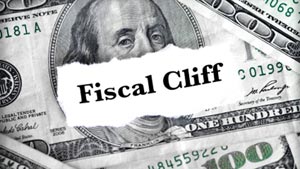The continuing political deadlock in the USA over the ‘fiscal cliff’ could provide investors with an investment opportunity, according to one fund management firm.
US lawmakers are wrangling over a solution which will avert more than £370 billion in tax rises and government spending cuts.
Economists say that unless a deal is reached soon, the consequences could derail the fragile US economic recovery.
The political logjam has seen worries over the scenario leading to various stock sectors declining on the markets, especially emerging stocks, consumer and energy companies.
But managers at the JP Morgan US Equity Income Fund say that dividends are still growing for many stocks and their valuations are reasonable – and there are some bargains to be had.
A spokesman said: “We believe politicians in Washington will reach a solution to the fiscal cliff.
Taxing dividends
“There’s a new political geography in Washington and necessity is likely to push both sides towards a compromise settlement.
“President Obama was elected with a promise to increase taxes on the wealthy and so is likely to rescind most tax cuts for low earners advanced before he was president, but he may have to also drop his planned spending cuts to balance the books.”
On the table for discussion is a plan about how to tax stock dividends, which is causing concern to many American investors.
That’s because capital gains have been taxed at 15% since 2003, but this is likely to cease with investors instead taxed at their ordinary income tax rate.
Tax paid on US dividends by UK investors will stay the same, but some fear that the performance of dividend paying stocks could be badly affected once a fiscal cliff agreement is reached.
“A change in the tax regime is unlikely to affect investment since income producing stocks have always outperformed stocks without a dividend – even when the taxes were much higher,” explained the spokesman.
Look for high yields
“Between 1979 and 2002, dividends were taxed at between 50 and 70%, but income producing stocks still delivered a 3% better performance.”
He pointed out that any tax changes would mainly affect earning £124,000 or more and households with joint incomes of more than £155,000.
Also, most income producing stocks are held in retirement savings or company pensions in which no tax is due on dividends.
“This means that investors should look for high yielding sectors on the US stock market because there are lots of companies yielding 2% or more with a good valuation,” said the spokesman.
